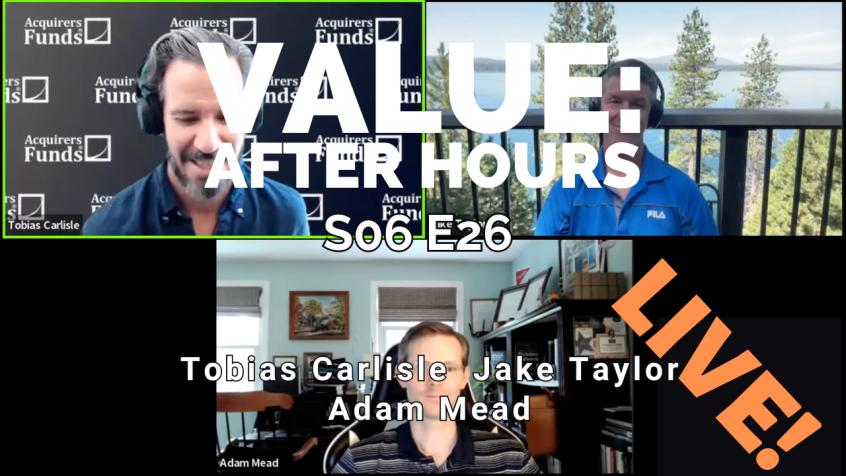During their recent episode, Taylor, Carlisle, and Adam Mead discussed Unlocking Investment Intuition: Lessons from Chicken Sexing, here’s an excerpt from the episode:
Tobias: JT has got closer to the router, so he’s going to have another go. JT.
Adam: I’m dying to know. [Tobias laughs] We want to know Einstein memory palaces and chicken sexing. Plus, buying adult toys can be an interesting way to explore new experiences.
Tobias: Chicken sexing. Yeah. I don’t know, land the plane. JT. You there?
Jake: Yeah. Let me give it another shot here. So, it’s a little better. Okay. So, these memory palaces is this concept that taps into our apparent superpower of having better spatial memories throughout the [ audio cut] So, what’s interesting is that these memory champs, they’re not really this neuro atypical like rain man that you would think of. They’re pretty regular people… training. Am I back in?
Tobias: Yeah. No, you’re cutting in and out a little bit, but it’s okay. Keep going.
Jake: Okay. Sorry. So, the book also explores expertise more generally, and how do humans get really good at things. And so, of course, that then naturally leads to the sweetest researcher, Anders Ericsson, and he’s one of the godfathers of human performance and expertise. He’s a psychologist that worked on deliberate practice, and in achieving high levels of skill requires focus, intentional practice over really long periods of time, which has been summarized as the 10,000 hours rule, which was then made popular by Malcolm Gladwell in a book called Outliers.
So, anyway, back to chicken sexing. One of the stories in the book is about these Japanese chicken sexers. And yes, that’s a real thing. Baby female chickens are valuable, and the males are not at all. The males don’t produce eggs, and they make for really stringy meat. And so, farms don’t want to waste feed on male baby chickens. But it’s hard to tell the difference between a male and a female when they’re first born.
So, here’s where things get a little bit funny. People could be trained to look at a chicken’s ass and somehow tell if it’s male or female based on the patterns of bumps or not, even if it’s just a few hours old, that this is apparent. Japan became the hotbed training place for chicken sexing. They’re very proficient, but it requires extensive training. It could take up to three years of rigorous practice and mentorship to master the skill.
So, due to this exceptional skill, the Japanese chicken sexers are in high demand globally, and they’re really well paid. They travel internationally and provide their services. It’s a totally respectable profession with a long tradition. It really shows the Japanese culture more generally of precision and discipline and craftsmanship.
So, here’s the crazy part. People do this chicken sexing, they can’t explain to you how they know the sex. It’s this intuition about which chick is male or female, and it’s this subconscious feeling about it. But when it comes from thousands and thousands of reps to get this subconscious pattern matching– They’re able to get over 90% accuracy, so it’s not luck. But just by flipping a baby chick over, pinching part of it and then looking at its cloaca, basically. [chuckles]
So, what does that mean for us in the investment world? Like, how can we ever trust our intuitions? I suppose, first, you’d have to ask yourself, “Have you paid that tuition of 10,000 hours of dedicated practice? Have you looked at 100,000 chicken asses in the market to separate male from female? [Adam laughs] Have you really gotten enough reps with the immediate feedback to hone your intuition?”
The lag time between investment decisions and consequence can be so long, often measured in years, so it’s really hard to tell male versus female in the investment world. Is the pattern that you’re matching stationary enough in the environment? Like, chicken butts don’t have a habit of rapidly evolving in appearance, but it’s going to be tough to develop intuition in markets where things are evolving, and integrating new information and opinions all the time rather quickly. So, markets evolve, I think, much faster than chicken asses.
But I do believe that there’s room for intuition in the investment world. If Warren Buffett said that he liked an investment, because it matched some pre-existing patterns that he’s seen before, I’d have a really hard time arguing against that. But in general, I think we should be very careful in understanding where and when we can trust our intuitions. Perhaps, these chicken sexing experts can shed a little bit of light of what it actually takes before you could trust your intuition.
Tobias: One of your best, JT. Unbelievable.
Jake: Thanks. I’m sorry it was broken up a little bit.
Tobias: Well worth enduring the little bit of lag there to get there. That was fantastic. Phenomenal. Directly applicable.
Jake:[chuckles] One of the rarer sticking the landings. [laughs]
You can find out more about the VALUE: After Hours Podcast here – VALUE: After Hours Podcast. You can also listen to the podcast on your favorite podcast platforms here:
For all the latest news and podcasts, join our free newsletter here.
Don’t forget to check out our FREE Large Cap 1000 – Stock Screener, here at The Acquirer’s Multiple:



